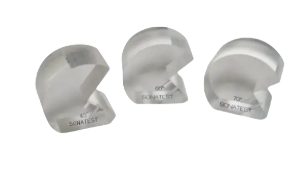
NM01SNW6270S
The SONATEST 70 Deg Snail Wedge 5/8"x5/8" is a specialized acrylic wedge designed for use with Sonatest or other compatible 5/8" x 5/8" single crystal shear wave ultrasonic transducers. This wedge is specifically engineered to introduce a refracted shear wave at a nominal angle of 70 degrees into the test material (typically steel). The "Snail" designation refers to its compact and often curved design, which facilitates scanning and access in various inspection scenarios.
Key Features:
70 Degree Refracted Angle: Precisely manufactured to provide a 70-degree refracted shear wave angle within the material being inspected. This angle is commonly used in ultrasonic testing for the detection and characterization of various flaw orientations, particularly in weld inspections according to AWS and other standards.
5/8" x 5/8" Probe Interface: Designed with a contact area of 5/8 inch by 5/8 inch to ensure optimal coupling and compatibility with similarly sized single crystal shear wave transducers, such as those in the Sonatest SSG or PSS series.
Snail Design: The "Snail" or "SNW" (Sonatest Narrow Wedge) design is characterized by its compact footprint and ergonomic shape, often featuring a curved leading edge. This design can improve maneuverability and access in restricted areas or around curved surfaces.
Material Composition: Typically made from acrylic or a similar polymer material known for its good acoustic transmission properties at ultrasonic frequencies, ensuring efficient transfer of sound energy from the transducer into the test piece.
Attachment Method: Sonatest snail wedges are typically attached to compatible transducers using screws that fit into threaded holes on the transducer housing (often 4-40 threaded holes for 5/8" x 5/8" probes).
AWS Compatibility: These wedges often meet the requirements of the American Welding Society (AWS) structural weld code for angle beam inspection.
Applications:
Ultrasonic inspection of welds to detect discontinuities such as cracks, lack of fusion, and slag inclusions. The 70-degree angle is particularly effective for detecting transverse flaws.
General angle beam ultrasonic testing for flaw detection and characterization in various materials and geometries.
Inspection scenarios where a compact wedge design is beneficial for access and maneuverability.
